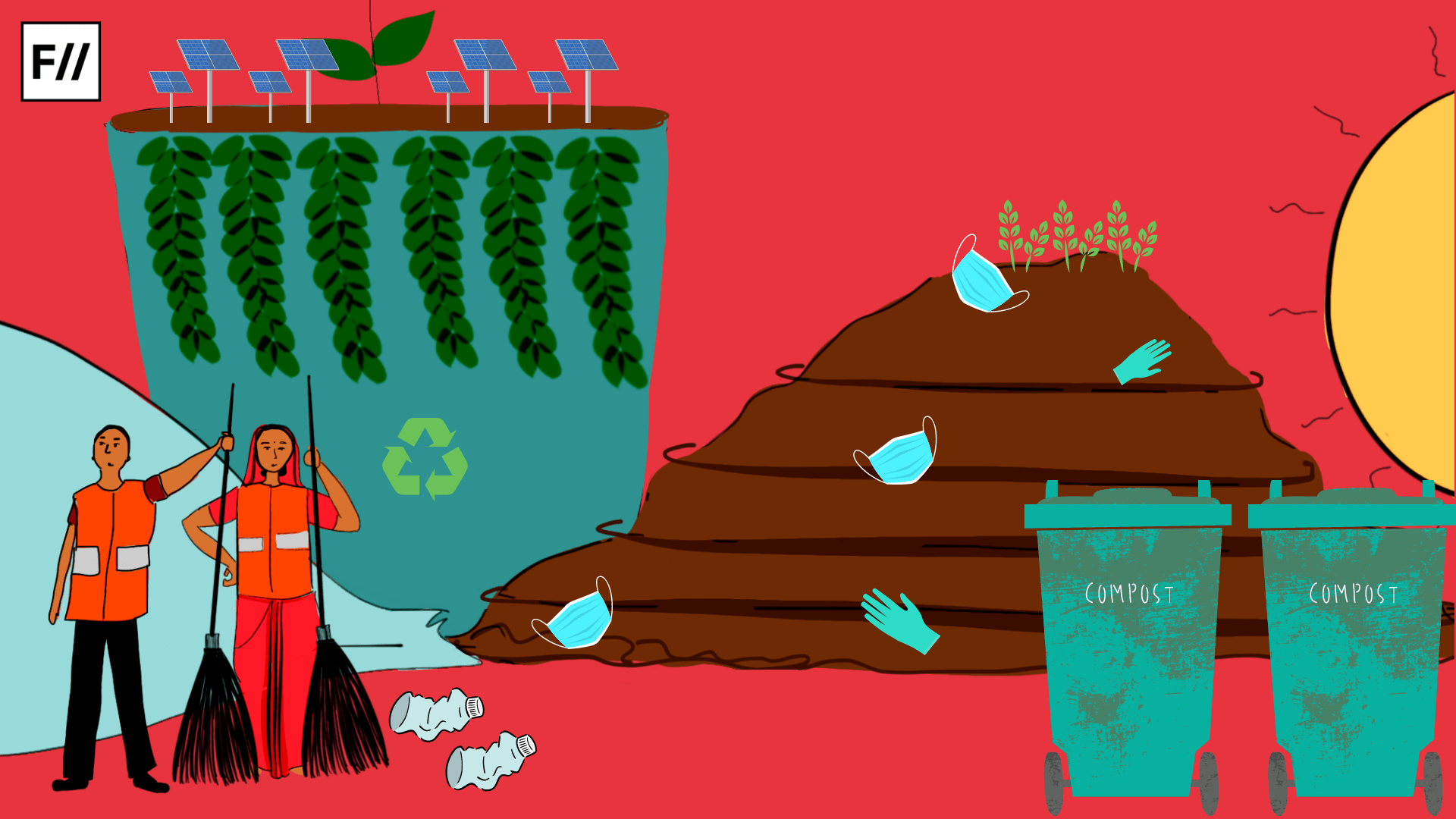We are all aware of the fact that the natural resources available to us are not limitless, and we must keep in mind the conservation and protection of the planet as we spearhead developmental initiatives. Sustainability is a running theme in our lives, both public and private, owing to its pervasiveness.
Sustainability as a narrative has become extremely prominent, political and personal especially in the context of the Covid-19 crisis. In the light of these emergent conversations on sustainability, we at Feminism In India invite your submissions on Sustainability throughout July 2021. July is also celebrated as global Plastic Free Month, and we hope to add to the discussions

The context of the Covid-19 pandemic underlines the need for us to orchestrate the use of resources as well as services and channelise their distribution in social, ecological and technical systems with a larger goal of maintaining long-term sustainability. Since the onset of the pandemic, we have been put in intimate touch with the necessity of stressing focus on food sufficiency, waste management, eco-friendly consumption and sustainable policy decisions. In situations of the supply chain being jeopardised globally, it is our local self-reliance in food production and waste disposal that act as the most fundamental arms of survival.
This has also led to the much-needed scrutiny of governmental policy-making and its lack of inclusion of the marginalised who find themselves without aid when calamities hit. Sustainability, hence, is also a lens that must be used in the legal and policy framework to cut across social privileges and integrate all sections of the population, and slowly move towards a social environment founded on parity.
Also read: Internal Displacement: Our Developmental Politics Has No Concern For The Marginalised
We have struggled with disaster management through the pandemic since rescue and rehabilitation efforts are challenged by the looming threat of the virus. This has amplified the conversations on climate change, the viability of manmade structures like dams, the over-utilisation of resources, deforestation, carbon footprint, and industrial activities that fail to take into account the need for sustainable planning.
Our consumption patterns are under the scanner now more than ever, as we have all realised the need to go back to our local vendors to source food, as well as make sustainable life choices. The conversation on sustainable menstruation, period costs and the specific problems in transferring the onus of eco-friendly menstruation on menstruating individuals alone is also one that has gained more focus. This also re-surfaces the discussion on social and economic privilege, and the lack of access to sustainable alternatives for everyone alike.
Also read: Jugaad—A Way To Reduce Plastic Waste & Keep Our Privileges In Check

Thus, sustainability as a narrative has become incredibly prominent, political and personal, especially in the context of the Covid-19 crisis. In light of these emergent conversations on sustainability, we at Feminism In India invite your submissions on Sustainability throughout July 2021. July is also celebrated as Global Plastic Free Month, and we hope to add to the discussions.
Here are some possible themes within the concept of sustainability that may help you write your submissions:
- The need for sustainability in policy decisions – scrutinising governmental policies and social security packages, assessing the effectiveness of initiatives like the Swach Bharath mission in promoting an eco-friendly conscience
- Pandemic and waste disposal – the ambiguities of waste management, security of frontline waste collection employees, disposal of essential Covid gear like surgical masks, PPE kits and gloves
- Sustainable alternatives of living – ways to replace single-use plastics and make more sustainable choices in everyday life
- Elite sustainability – urban narratives of aping Western consumption patterns, replacing locally available food grains and proteins for expensive, environmentally damaging options
- Conversations on climate change
- Feminism and sustainability – eco feminism and its relevance, the relationship between sustainability and the feminist movement
- Sustainable menstruation – public health budgets and the cost of menstruation, period poverty, access to sanitation infrastructure
- The consumption of meat as a political tool to underline the upper-caste agenda – othering meat eaters through caste assertion, religious connotations around food patterns that are problematic
- Gender, domestic work and sustainability – the assignment of gender roles to waste segregation and disposal at home, shifting the burden of maintaining vegetable gardens and allocating monthly food budgets on women
- Traditional knowledge and generational practices in sustainability, community stories about indigenous, eco-friendly practices
- Intersectionality and sustainability – access and privilege as inhibiting elements to sustainable choices, the cost of being sustainable and marginalised, mainstream sustainability and its exclusion of marginalised experiences
- Sustainable fashion – the environmental problems of fast fashion, thrifting and using pre-owned clothes as sustainable trend, incorporating eco-friendly fabrics into fashion
- The representation of sustainability in popular culture and films – the depiction of dietary trends like veganism in pop culture, the cinematic stereotypes surrounding organic living, critical analysis of tropes that amplify elite sustainability through visual media
- Personal essays on your journey with sustainability – insights on being a plant parent, anxieties around house plants and their longevity
- Dietary experiments and lifestyle changes – veganism, vegetarianism, the private dilemmas of consuming meat
This list is not exhaustive. Please feel free to write on other topics within the theme that we may have missed listing here. You may send us your submissions to sukanya@feminisminindia.com. We look forward to your submissions and hope you enjoy writing them!
Featured Image: Ritika Banerjee for Feminism in India
About the author(s)
Feminism In India is an award-winning digital intersectional feminist media organisation to learn, educate and develop a feminist sensibility and unravel the F-word among the youth in India.




